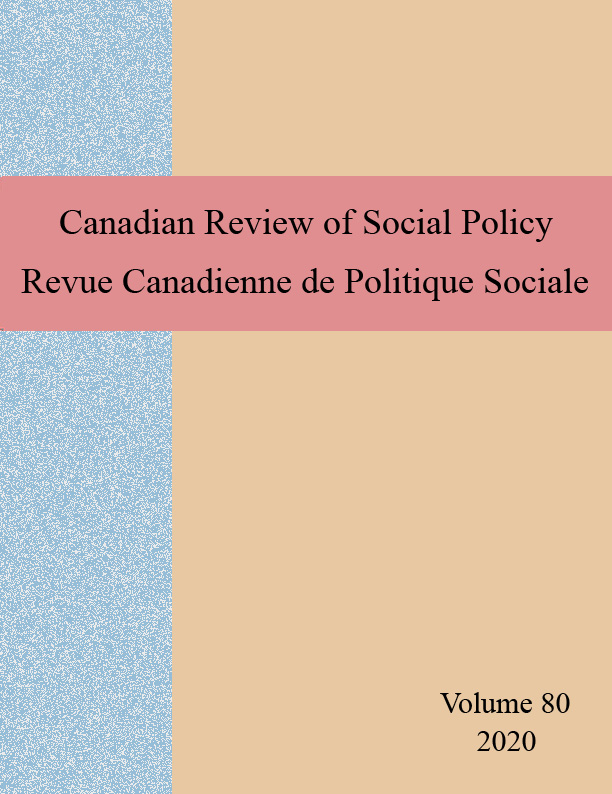Repenser l'itinérance chez les jeunes au Québec : vers un paradigme intersectoriel et intersectionnel de la prévention
Keywords:
itinérance, jeunesse, préventionAbstract
Afin de lutter contre l’itinérance, différentes mesures politiques ont récemment vu le jour au Québec. L’adoption de plans d’action régionaux, d’avis municipaux et d’une politique nationale témoigne de l’émergence d’une volonté politique de mettre fin à l’itinérance au Québec. Si plusieurs de ces mesures reconnaissent l’importance de la prévention comme stratégie pertinente de lutte à l’itinérance, peu d’efforts sont consacrés à la mise en place d’actions concrètes et concertées pour prévenir l’itinérance, en particulier chez les jeunes. En s’inspirant des travaux de l’Observatoire canadien sur l’itinérance, cet article pose les jalons d’une nouvelle perspective québécoise sur la prévention de l’itinérance chez les jeunes. En tant que chercheur.e.s engagé.e.s dans le champ de l’itinérance, nous présentons ici une réflexion qui soutient l’importance de se dégager d’un paradigme d’intervention centré uniquement sur la logique d’urgence afin d’adopter, plutôt, un paradigme d’intervention centré sur la prévention. Ce changement de paradigme s’appuie sur une perspective intersectorielle et intersectionnelle afin de construire, avec les différents acteurs, une vision globale, cohérente et concertée de la prévention de l’itinérance chez les jeunes au Québec.
Abstract
Several political measures were recently adopted in Quebec to address the issue of homelessness. The introduction of regional action plans, municipal notices and a national policy signals the emergence of a political will to end homelessness in Quebec. However, while the new measures include prevention strategies to combat homelessness, there has been little effort devoted to concrete actions, especially for youth experiencing or at risk of homelessness. This article paves the way for a new perspective on youth homelessness, drawing inspiration from the prevention shift put forward by the Canadian Observatory on Homelessness. Our goal, as engaged and committed researchers in the field of homelessness, is to provoke a reflection which we hope will accommodate the emergence of a paradigm shift based on prevention instead of relying on emergency responses. This shift in the fight against this phenomenon among young Quebecers is based on an intersectoral and intersectional model in order to build, with various stakeholders, a global, coherent and concerted vision of the prevention of youth homelessness in Quebec.
Keywords: homelessness; youth; prevention
Downloads
Published
How to Cite
Issue
Section
License
1-The author guarantees that the manuscript is an original work not published elsewhere in print or electronically in whole or in part, except in abstract form, that the author has the full power to make this contribution, and that the manuscript contains no matter libelous or otherwise unlawful or which invades the right of privacy or which infringes any proprietary right.
2-The author guarantees that the manuscript has not been previously published in print or electronically and that if the manuscript contains any tables, figures or images fully reproduced or closely adapted from previously published material, the author must obtain the necessary permission from the author/publisher holding the original copyright prior to publication in CRSP. The author may be required to produce evidence of permission granted to CRSP’s editors.
3-As a condition of publication in CRSP, the author assigns all copyright to CRSP, including but not limited to the right to publish, republish, and otherwise distribute this manuscript in print, electronic, or other formats. As CRSP is a non-profit interdisciplinary scholarly journal, the author will receive no royalty or other monetary compensation for the assignment set forth in this agreement.
For the purpose of full disclosure, CRSP will not normally use the content provided by the author in a commercial venture, but for the purpose of disseminating the author’s content to as many readers as possible. For distribution, third parties engaging in commercial activities may be contracted to distribute the content globally, and such parties may make a profit out of the author’s content in their normal course of business. CRSP will not pay the author or reimburse the author in any form based on such commercial activities because the conduct of such commercial activities is outside the control of CRSP.
Any future reference to or use of this published material by the authors must acknowledge CRSP as the original place of publication.
PERMISSION REQUEST/ARCHIVING
Permission is given to author(s) receiving funding via Tri-Council Agencies, the Canadian Institutes of Health Research (CIHR), the Natural Sciences and Engineering Research Council of Canada (NSERC) and the Social Sciences and Humanities Research Council (SSHRC), to make their publications freely available in an Open Access repository within the stated deadline by the Tri-Council Agencies (12 months following publication). Archiving of publication must be a manuscript copy bearing none of the CRSP headers, footers or any other distinguishing marks. No links to the article on the CRSP website is permitted.
Permission requests from third parties to reproduce articles in part or full in academic/educational publications can be directed to the managing editor of CRSP, and will not be unreasonably denied.

